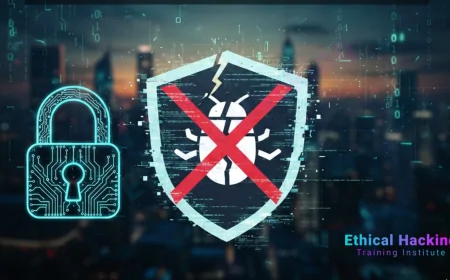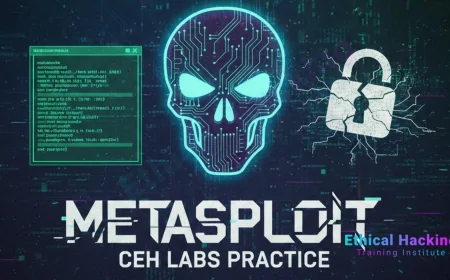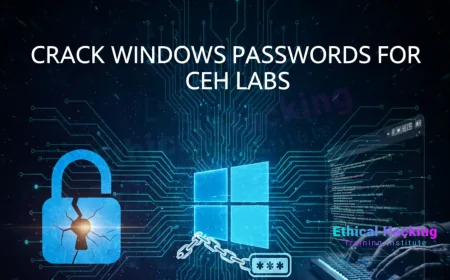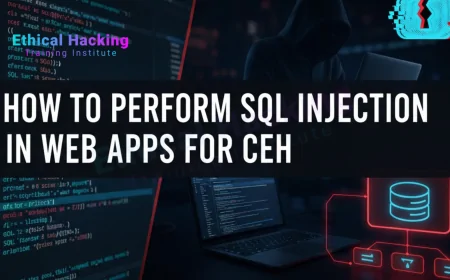Honest Review of CPENT EC-Council Certification | Is It Worth Your Time and Effort?
Looking for an honest review of the CPENT EC-Council certification? This in-depth guide covers exam difficulty, training benefits, real-world skills, and how CPENT compares to other ethical hacking certifications. Find out if CPENT is the right choice for your cybersecurity career.
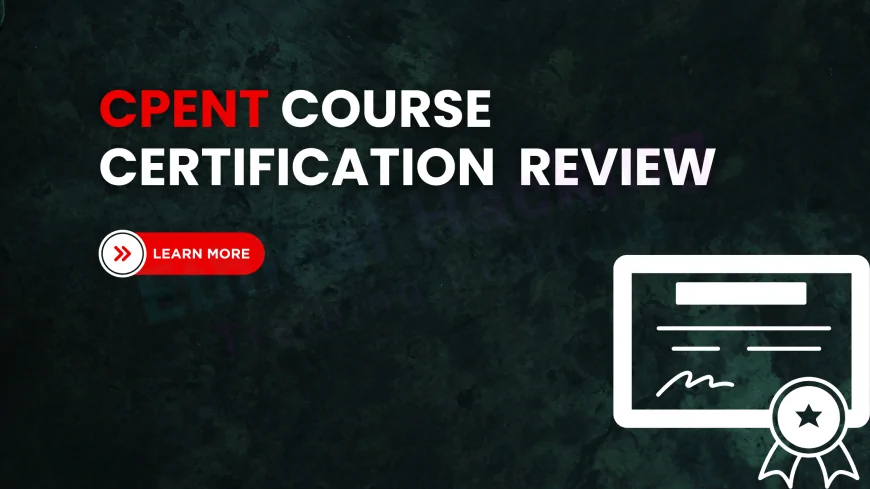
Imagine a global bank suffers a massive breach despite having cutting-edge cybersecurity tools in place. The cause? A minor misconfigured service exploited by an attacker using advanced techniques. This is where ethical hackers with high-level penetration testing skills come in—not to break systems, but to fix the invisible cracks before someone else finds them.
In a world that needs deep offensive security skills, EC-Council’s CPENT (Certified Penetration Testing Professional) aims to be the gold standard for proving advanced capabilities. But how does it actually measure up in real-world value?
Let’s explore this from every angle: training experience, exam difficulty, real-world relevance, career ROI, and more—minus the marketing fluff.
1. What is the CPENT Certification?
CPENT (Certified Penetration Testing Professional) is an advanced, performance-based certification from EC-Council that aims to validate a cybersecurity professional’s ability to conduct comprehensive penetration tests in enterprise environments.
Unlike theoretical or multiple-choice-based exams, CPENT is entirely practical, simulating complex enterprise networks across cloud, web, IoT, and on-premise systems.
Goal:
Prove your ability to think like a black hat, test like a professional, and report like a consultant.
2. CPENT vs Other Certifications (OSCP, CEH, eJPT)
| Feature | CPENT | OSCP | CEH | eJPT |
|---|---|---|---|---|
| Practical-based | Yes | Yes | Mostly theory | Entry-level labs |
| Exam Duration | 24 hours | 24 hours | 4 hours | 2–3 hours |
| Difficulty | Advanced | Advanced | Intermediate | Beginner |
| Cloud/IOT Testing | Covered | Limited | No | No |
| Reporting Required | Yes | Yes | No | No |
Bottom Line: CPENT fills a unique gap between CEH and OSCP, offering enterprise-scale assessments, reporting, and modern attack surfaces.
3. What You’ll Learn in CPENT
The CPENT curriculum is not just about breaking into boxes. It covers:
-
Advanced Windows exploitation
-
Active Directory attacks
-
PowerShell scripting
-
Web app attacks
-
Fileless malware
-
Reverse engineering basics
-
Binary exploitation
-
Pivoting & lateral movement
-
Wi-Fi and IoT hacking
-
Cloud-based penetration testing
-
Post-exploitation tactics
-
Report writing & documentation
The training materials emphasize real-world, multi-layered environments—a notable leap from beginner certs.
4. Real-World Skills Covered
What sets CPENT apart is its emphasis on enterprise realism. You’re not just popping a shell—you’re navigating segmented networks, hybrid cloud environments, and creating pivot chains.
Key takeaways:
-
Cloud penetration testing using AWS and Azure scenarios
-
Simulated multi-vector attacks against layered security systems
-
Hands-on Active Directory exploitation
-
Development of custom exploits using scripts or automation
-
Real-world post-exploitation persistence mechanisms
These are the bread and butter of any red teamer or penetration tester working in a corporate environment.
5. Exam Structure: Brutal or Brilliant?
CPENT is a 24-hour exam that can be taken in two 12-hour segments or one full stretch. The exam involves attacking a live enterprise network with various vulnerabilities.
Objective: Score at least 70% to pass CPENT, or 90%+ to earn the prestigious LPT (Master) certification.
What you get:
-
A remote lab environment
-
Required to submit a comprehensive penetration test report
-
Documentation, screenshots, recommendations included
You’re being tested not just on hacking—but on being a professional tester, with all the documentation and deliverables expected in a real-world scenario.
6. CPENT Difficulty Level – An Honest Breakdown
Make no mistake—CPENT is hard. Not OSCP hard in terms of deep exploit dev, but hard in terms of multi-step logical attack chains.
Where people struggle:
-
Creating pivot chains
-
Exploiting Active Directory trusts
-
Time management in a 24-hour high-pressure setting
-
Writing a solid professional report under fatigue
You need more than just knowledge—you need endurance, strategy, and practice.
7. Who Should Take CPENT?
Ideal for:
-
Intermediate to advanced ethical hackers
-
Professionals preparing for red team roles
-
Cybersecurity analysts who want to validate their offensive skills
-
CEH holders looking to level up
-
Anyone aiming for LPT (Master)
Not ideal for:
-
Beginners with zero pentesting experience
-
Those afraid of hands-on testing
-
People looking for “easy certs”
8. Career Benefits: Does It Boost Your Resume?
Yes, especially if you’re applying for roles like:
-
Penetration Tester
-
Red Team Operator
-
Security Consultant
-
Vulnerability Analyst
-
SOC Team Member with Offensive Skills
Employers respect CPENT for its realistic environment and report-writing component. It’s not just about the hack—it’s about communicating findings like a professional.
Key Career Benefits:
-
Demonstrates enterprise-level skill
-
Bridges the gap between CEH and OSCP
-
Validates cloud, IoT, and AD expertise
-
Recognized globally by employers
9. CPENT Cost vs Value: Is It Worth the Investment?
As of 2025, CPENT's pricing structure may vary based on bundles and labs. Typically:
-
Exam Only: ~$900
-
Training + Labs + Exam: ~$2,000–$2,500
Is it worth it?
Yes, if:
-
You're already in cybersecurity and want to elevate your credibility
-
You want a practical cert with modern testing scenarios
-
You're aiming for red teaming or advanced pentesting roles
Maybe not if:
-
You're on a tight budget and just starting out
-
You won’t use the knowledge practically
10. What CPENT Does Better Than Others
-
Offers cloud-focused testing (rare among certs)
-
Covers Active Directory pivoting
-
Simulates real enterprise architectures
-
Includes IoT and SCADA security
-
Forces you to document and present findings
Unlike many practical certs, CPENT mimics how real clients, CISOs, and auditors expect deliverables.
11. Where CPENT Falls Short
Every cert has drawbacks. Here are some honest issues people face with CPENT:
-
Support community is smaller than OSCP’s
-
Limited free resources or writeups
-
High exam fatigue from the 24-hour format
-
Lab environments can be inconsistent or buggy
-
The reporting requirement adds stress if you're not used to consulting work
12. Community Feedback & Common Complaints
From forums and Reddit threads, common feedback includes:
-
"The exam was realistic but brutal—I barely made it in 24 hours."
-
"Wish there were more community writeups and practice labs."
-
"Great coverage of AD and cloud, but reporting was overwhelming."
Most agree that the value is real, but it’s not a walk in the park.
13. Hidden Realities You Should Know
-
No back button during the exam interface: Choose actions carefully.
-
The exam may include decoy machines—don’t waste time.
-
You need to submit your report in a precise format, or risk automatic failure.
-
Time management is as important as technical skills.
-
No partial credit unless properly documented.
14. CPENT vs LPT Master Path
Here’s the twist: Score above 90% in CPENT, and you don’t need to take a separate exam for LPT Master—you get it automatically.
LPT Master = One of the rarest red-team certs with professional weight.
If you’re aiming for high-end consulting or leadership in red teams, LPT is a solid badge on your résumé.
FAQ's
1. What is the CPENT EC-Council Certification?
CPENT is a hands-on certification designed for ethical hackers to validate their advanced penetration testing skills. Ethical Hacking Training Institutes in Pune often recommend this to professionals looking to simulate real-world enterprise attacks and expand their cybersecurity careers into red teaming, cloud security, and advanced network exploitation.
2. Is CPENT certification recognized by employers in India?
Yes, CPENT is recognized by cybersecurity recruiters and employers, especially in Pune’s growing tech industry. It showcases hands-on expertise in ethical hacking and enterprise penetration testing, making candidates more competitive for roles in security operations centers (SOCs), red teams, and cyber defense consultancies.
3. How does CPENT differ from CEH or OSCP?
While CEH is more theoretical and OSCP focuses on exploit development, CPENT combines advanced real-world simulations with reporting skills. Ethical Hacking Training Institutes in Pune highlight CPENT for its enterprise-based labs covering IoT, cloud, and Active Directory environments, making it a balanced yet challenging credential.
4. What are the prerequisites for CPENT training in Pune?
Ethical Hacking Institutes in Pune generally recommend having knowledge of networking, Linux, and basic penetration testing (like CEH). Prior hands-on experience is crucial because CPENT dives deep into red teaming, pivoting, and complex post-exploitation techniques that demand intermediate to advanced skill sets.
5. Is CPENT training in Pune available online or offline?
Most Ethical Hacking Training Institutes in Pune offer both online and offline CPENT training formats. Online sessions allow flexibility for working professionals, while offline classes provide hands-on access to labs and local mentor support, ideal for those who prefer interactive in-person learning.
6. What skills will I gain from CPENT training?
CPENT training equips you with advanced skills like multi-layered network attacks, cloud penetration testing, web application exploitation, pivoting, lateral movement, and report writing. Ethical Hacking Institutes in Pune use real-world scenarios to prepare students for enterprise security roles and consulting positions.
7. How long does CPENT training take in Pune?
Typical CPENT training in Pune lasts 6–8 weeks, depending on the mode and intensity of the course. Ethical Hacking Institutes often offer weekend and fast-track batches to suit working professionals looking to upskill in cybersecurity within a flexible schedule.
8. What is the cost of CPENT training and certification?
In Pune, CPENT training with lab access typically ranges from ₹75,000 to ₹1,20,000 depending on the institute and resources included. This covers expert-led classes, hands-on lab practice, and exam vouchers, making it a valuable investment for aspiring ethical hackers and security professionals.
9. Are CPENT labs accessible for practice after class?
Yes, reputable Ethical Hacking Training Institutes in Pune provide remote lab access for students to practice outside classroom hours. These labs simulate real-world enterprise networks, allowing learners to gain confidence and refine their skills before attempting the 24-hour CPENT certification exam.
10. What kind of jobs can I get after CPENT certification?
CPENT opens doors to roles like Penetration Tester, Red Team Operator, Security Analyst, and Cybersecurity Consultant. In Pune, IT companies actively seek professionals with CPENT-level expertise due to their ability to simulate advanced cyberattacks and deliver actionable security reports.
11. Is CPENT worth it for someone already certified in CEH?
Absolutely. CPENT is a logical next step after CEH, offering deeper practical exposure. Ethical Hacking Training Institutes in Pune recommend it to CEH-certified individuals looking to advance into offensive security roles and demonstrate real-world skills required for enterprise-level cybersecurity challenges.
12. How difficult is the CPENT exam?
The CPENT exam is tough—it lasts 24 hours and requires practical exploitation, pivoting, and professional report writing. Ethical Hacking Training Institutes in Pune prepare candidates through rigorous labs and mock exams, ensuring they’re ready for the time-pressured, real-world exam format.
13. Do institutes in Pune offer CPENT mock exams?
Yes, most Ethical Hacking Training Institutes in Pune include mock exams in their CPENT curriculum. These simulations help learners manage time effectively and gain familiarity with the live exam interface, giving them a higher chance of success on the final test.
14. Does CPENT include cloud security testing?
Yes, CPENT covers cloud penetration testing including AWS and Azure environments. Ethical Hacking Training Institutes in Pune teach students to identify misconfigurations, exploit services, and test cloud infrastructure—skills that are in high demand across modern IT companies.
15. Can I get placement support after CPENT training in Pune?
Many Ethical Hacking Training Institutes in Pune offer placement assistance, including resume building, interview preparation, and referrals. CPENT-certified candidates often receive attention from cybersecurity firms, consulting agencies, and managed security service providers (MSSPs) in India’s growing job market.
16. Is CPENT certification valid internationally?
Yes, CPENT is globally recognized. It’s a performance-based certification that aligns with international job roles in red teaming and ethical hacking. Ethical Hacking Institutes in Pune emphasize its relevance for students seeking overseas cybersecurity roles or freelance penetration testing work.
17. What’s included in CPENT training kits in Pune?
CPENT training kits from Ethical Hacking Institutes in Pune typically include courseware, access to enterprise labs, practice challenges, toolkits, and reporting templates. These resources ensure students can practice advanced techniques and meet the report-writing standards required for certification.
18. Can CPENT be pursued while working a full-time job?
Yes. Institutes in Pune offer CPENT training with evening or weekend batches tailored for working professionals. With remote labs and recorded sessions, learners can manage their time effectively while preparing for a high-impact certification like CPENT.
19. How is CPENT different from traditional ethical hacking courses?
Traditional ethical hacking courses focus on basic tools and theoretical knowledge. CPENT goes beyond by offering deep practical exposure, real-world testing environments, and cloud/IoT scenarios. Ethical Hacking Training Institutes in Pune position CPENT as a premium-level, career-transforming certification.
20. What are the top benefits of CPENT training in Pune?
Top benefits include mastering enterprise-grade hacking, real-world exam readiness, cloud and IoT exposure, and strong placement potential. Ethical Hacking Institutes in Pune help learners gain hands-on expertise, boost their cybersecurity credentials, and stand out in India’s competitive IT job market.
15. Final Verdict: Should You Go for It?
If you’re serious about offensive cybersecurity and want a comprehensive, enterprise-ready certification, CPENT delivers real value.
Choose CPENT if:
-
You already have CEH or equivalent knowledge
-
You want to move beyond "box popping" to strategic offensive security
-
You want a cert that validates professional-level pentesting
Skip it if:
-
You’re looking for an easy certification
-
You don’t have time to invest in preparation or report writing
-
You just want to collect acronyms
Tags:
What's Your Reaction?
 Like
0
Like
0
 Dislike
0
Dislike
0
 Love
0
Love
0
 Funny
0
Funny
0
 Angry
0
Angry
0
 Sad
0
Sad
0
 Wow
0
Wow
0
